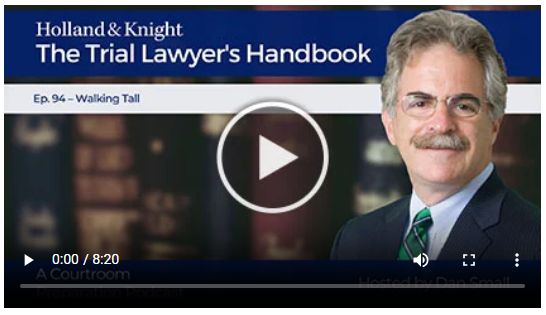- in European Union
- within Criminal Law topic(s)
- in European Union
- with readers working within the Oil & Gas industries
- within Compliance topic(s)
In this episode of his "The Trial Lawyer's Handbook" podcast series, litigation attorney Dan Small recounts a compelling story from Appling County, Georgia, where corruption and drug smuggling under a powerful sheriff threatened the integrity of the community. A local resident motivated by a sense of justice, but lacking law enforcement experience, took it upon himself to run for sheriff. After narrowly winning, he sought federal assistance and collaborated with the FBI and U.S. Attorney's Office in an effort to save his county. The episode highlights the slow, complex federal investigation involving Racketeer Influenced and Corrupt Organization Act (RICO) charges, undercover operations and community doubt amid procedural delays. In sharing this case, Mr. Small reflects on how legal battles impact real lives and communities.
Podcast Transcript
Dan Small: Secrets are hard to keep in a small town or county, but they can easily tear it apart. Appling County — that we've been talking about in prior episodes — in rural Georgia became extremely divided between those who didn't want drug smuggling and those who supported the powerful but corrupt sheriff and either didn't believe or didn't care about the rumors of illegal activity. Slowly but surely, the rule of law was melting away. But what could be done about it? The sheriff was, in many respects, the most powerful elected official in the county.
Lewis Parker had grown up in Appling County, in a family that had been there for generations. He didn't need the job, but as his complaints to the sheriff were ignored and suspicions of illegal activity grew, he decided that someone had to run against the sheriff. Lewis was not a law enforcement officer. The rumor was that his "training" included watching the movie Walking Tall three times, starring the tough but honest sheriff with a Bible in one hand and a big stick in the other.
So he ran for sheriff. And he won, but just barely. Lewis understood that he could not win the battle with drugs and corruption alone. So he did something extraordinary. Traditionally, there are few species more territorial than law enforcement, believe me. The sheriff's turf is his to rule and rarely shared. But Lewis ignored that, got in his car and drove an hour and a half to Savannah, the nearest Federal Bureau of Investigation (FBI) office, to beg for help.
As the FBI investigation progressed, they brought in the local federal prosecutor: Assistant United States Attorney Fred Kramer, a great trial lawyer and a great friend. As it developed further, the U.S. Attorney's Office thought it was appropriate to use the Racketeer Influenced and Corrupt Organizations Act, more commonly known as RICO. So they asked for help from the Department of Justice (DOJ). Which is how a young, Organized Crime and Racketeering Strike Force Attorney in Washington, yours truly, was told to get on a plane and see what the heck was going on down there.
The investigation proceeded. We were able to turn one of the deputies and convince him to wear a wire, which resulted in dramatic and devastating tapes. Eventually, we drafted a RICO indictment and sent it up the line for approvals. But all that took time. To normal people in normal circumstances, the criminal process happens quickly. There's crime, arrest, trial and jail. Simple. But not in a complex federal investigation. As the weeks and months passed, we got increasingly anxious calls from Sheriff Parker. The good people of Appling County were losing faith, afraid that so much time passing meant nothing would happen and the bad guys had won again — just like they had told everyone they would.
At first, Lewis did little things to keep up appearances. For example, he put signs in front of his office that said, "FBI Parking," and then had some friends park their cars there to show that there were people there. But as Lewis's calls got more desperate, more had to be done. So the FBI flew the United States Attorney and me down to reassure Lewis. He took us to lunch at a crowded local restaurant. The food was great, but I don't think Lewis ever sat down to eat. He spent the whole time going table to table greeting people. When I commented to one of the deputies, "He's quite the politician, isn't he?" The deputy said, "Oh no, not usually. He's just making sure that everyone here knows you're with the United States Department of Justice Organized Crime Strike Force in Washington, D.C. As soon as they leave, that news will spread like wildfire. By tonight, the whole county will know you're here."
Sure enough, by the time we got back to the sheriff's office after lunch, there was already a phone message from an attorney whose office was across the street and who was a close associate of the former sheriff. He wanted to talk to the U.S. Attorney. Lewis explained, "He doesn't want to talk to some foreigner from D.C. He thinks he can sweet talk the Georgia boy." But the U.S. Attorney was having none of it. "You're coming with me, Dan," he said, "and you take the lead."
So we left the sheriff and walked across the street. When the two of us walked in, Emmett, we'll call him Emmett, was surprised to see me, offered us both drinks — we declined — and started smooth talking the U.S. Attorney about just wanting everyone to get to know each other and be on the same team. The U.S. Attorney simply said, "Talk to him," pointing to me. And I said, "Emmett, the party is over for you and your pals here in Appling County. The train is leaving the station, and you can either be on it or under it. If you want to be on it, here's my card, call me. If you want to be under it, so be it. We're done here." And the U.S. Attorney and I turned and walked out.
Back across the street, the sheriff and his deputies were anxiously awaiting a report of our meeting, and they loved it. The investigation continued to take time and the sheriff's frustration grew. When he learned that there was a grand jury hearing evidence in Savannah, he wanted to come talk to them. I tried to dissuade him, but he insisted, and we were curious, so we gave in. So this big, tough sheriff came to the grand jury, broke down and wept. "You have to do something!" he pleaded. "You have to save my county! We're in terrible trouble and you may be the only people who can help!" It was completely genuine. By the time he was done, I felt like I should round up a bunch of horses, so the posse could saddle up and ride out after the bad guys. Walking tall.
Finally, we brought an indictment, and teams of FBI agents drove down to the county before first light to make coordinated arrests. Of course the grand jury operates in secret, so I couldn't tell the sheriff anything about the indictment. I just told him that something was going to happen that day that might draw attention, so could he and his deputies provide some security around the Appling County courthouse?
On the morning of the arrest, the sheriff had pulled in, I think, every uniformed deputy he had to guard the courthouse, while he and his friend, the chief of police of Baxley, the county seat, waited anxiously inside. Out their window, to their amazement, they watched a parade of the county's royalty brought in in handcuffs. Eighteen defendants in all. Finally, when the last arrest had been made, we unsealed the indictment. I walked into the little room where the two of them were waiting, dropped a copy of this detailed 65-page, 18-defendant indictment on the desk, and I said, "Enjoy."
We lawyers get caught up with the law, the evidence and the battle, and that's fine, but sometimes we lose sight of the forest for the trees. In Appling County, the forest was a county at a tipping point and the people who cared deeply about it not knowing what to do. Of the many good memories of that case and its people, one of the best remains a simple one: The laughter and exclamations of joy coming out of that little room as these two big, tough cops who cared, saw things they had long suspected, now written in black and white, people they had long suspected and even feared named as defendants and their long-suffering hopes for the county they loved coming to life. That laughter and joy will always stay with me as a reminder that as trial lawyers, sometimes we can impact people's lives in surprising ways.
The content of this article is intended to provide a general guide to the subject matter. Specialist advice should be sought about your specific circumstances.


